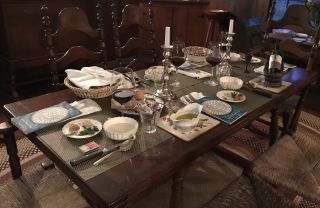Trauma
What Passover Can Teach Us About Historical Loss
A Personal Perspective: Passover traditions can help alleviate cultural trauma.
Posted April 10, 2023 Reviewed by Devon Frye
Key points
- Historical loss is the loss of a people's or an individual's language, land, rituals or other aspects of their cultural heritage.
- Talking about trauma and historical loss can mitigate their negative effects on subsequent generations.
- The annual Passover seder can teach us how to talk about cultural trauma and historical loss.
Loss can come in many forms. We can lose loved ones when they die or are separated from us. We can lose jobs and livelihoods that give our lives meaning and promise. We can lose aspects of our health and physical function that change the way we operate in the world.
And it turns out that we can lose our history.

I thought about this as I sat at a Passover seder this week. I felt connected to a tradition going back thousands of years, in which Jews have come together to tell their historical narrative of enslavement and liberation.
But I didn’t always feel that connection. The annihilation of my grandmother’s parents and siblings in concentration camps and my family’s ensuing code of silence estranged them from Judaism and kept them from passing on their heritage. With no spiritual or cultural training, I was an alien in a synagogue, unable to connect in any way to the historical tradition of my family and ancestors.
Stripped of history, I was unable to tell teachers where my family was from and was unaware of my family’s trauma until well into my 20s. Even therapists did not plumb this historical black hole, neither asking about it nor imagining that it had anything to do with what I’d come to talk about. Only now, as an older adult, am I learning the ancient language and traditions of my family, realizing along the way that I am trying to recover my historical loss.
Historical loss has been defined as the loss of an individual’s or a people’s language, rituals, land, religion, community, or other aspects of their cultural history. (Whitbeck et al., 2004). A predictable result of genocide, historical loss has been studied in the children and grandchildren of Native Americans and Holocaust survivors.
As the term “ethnic cleansing” suggests, these atrocities are meant to annihilate a people, a culture, or both. Separating individuals from their history by preventing them from speaking their language, living on historically meaningful land, or practicing spiritual traditions is one of the ways that dominant groups control non-dominant groups, helping to maintain systemic hierarchies (Moane, 2011).
The overwhelming trauma sustained by survivors of genocide often leads to silence about both trauma and historical loss. This silence compounds the loss, leaving generations to suffer from unresolved grief, disconnection, and other difficulties with mental well-being.
But there is another way. A recent study suggests that painful though it may be, empathic family communication about cultural trauma and historical loss predicts better mental well-being and less historical loss than does the all-too-frequent silence (Johns et al., 2022).
That, I thought as I ate my matzo, is exactly the function of the Passover Seder. The Torah instructs Jews to conduct this annual ritual of re-telling even before it tells the story itself.
Unlike other holidays, which focus on the synagogue, Passover centers on the home and family, enlisting all the senses (song, food, smells, postures) to help participants experience the story of trauma and liberation in a warm, loving, familiar environment. This rite of re-telling has become so important to Jews that, in oppressive societies, they have often risked certain death to conduct seders in secret. It’s remarkable that, even thousands of years ago, Jewish leaders and writers understood that telling the story would help mitigate the long-term effects of trauma and would promote a feeling of cultural belonging and well-being.
Unfortunately, families from all parts of the globe have been and continue to be victims of cultural trauma. Some traumas happened long ago, while some are occurring as I write.
How can we use the principles of the Passover tradition to try to alleviate the suffering of intergenerational transmission of trauma going forward?
- We can use a trauma-focused lens. Increasingly, psychological treatments consider trauma as a possible cause when anyone presents for help. Allowing ourselves, as consumers and providers of this treatment, to consider that remote or current trauma might be involved will help people to create narratives that link them to their personal, family, and cultural history.
- We can ask questions. The Passover seder models this by scripting “4 questions” that a child asks at the table to help learn about the family history. If we are fortunate to have elders in our family, we can ask them questions about their history and the history of their ancestors to help us fill in the gaps in our personal and familial narratives.
- We can share stories. Sharing stories of silence and trauma among families can offer information and connection. Films, books (fiction and non-fiction), museums, and cultural awareness programs can help with this as well.
- We can talk to our children. We need to tell our stories to our children. Whether they are stories of genocide, displacement, or discrimination, when told sensitively and empathically, they can help the next generation to feel connected and aware of their historical loss.
We cannot erase our historical losses. They happened and will continue to happen. But it’s clear that talking about these losses can help families contribute to their children’s mental well-being. And, as this 60-year-old Hebrew school student can attest, it’s not only children who benefit.
References
Johns AN, Brown LS, Cromer LD. Examining intergenerational transmission of Holocaust trauma as it relates to Jewish identity, communication type, and mental well-being. J Trauma Stress. 2022 Oct;35(5):1497-1507. doi: 10.1002/jts.22856. Epub 2022 Jun 22. PMID: 35733300.
Moane (2011) Gender and Colonialism: A Psychological Analysis of Oppression and Liberation, Palgrave MacMillan, London
Whitbeck LB, Adams GW, Hoyt DR, Chen X. Conceptualizing and measuring historical trauma among American Indian people. Am J Community Psychol. 2004 Jun;33(3-4):119-30. doi: 10.1023/b:ajcp.0000027000.77357.31. PMID: 15212173




